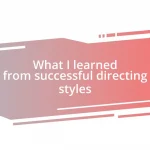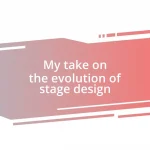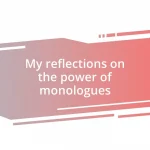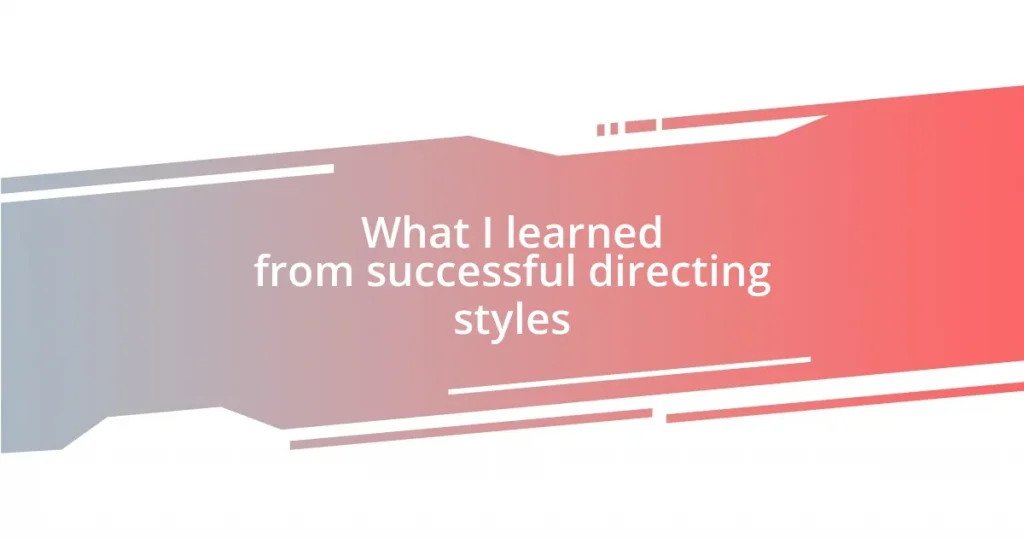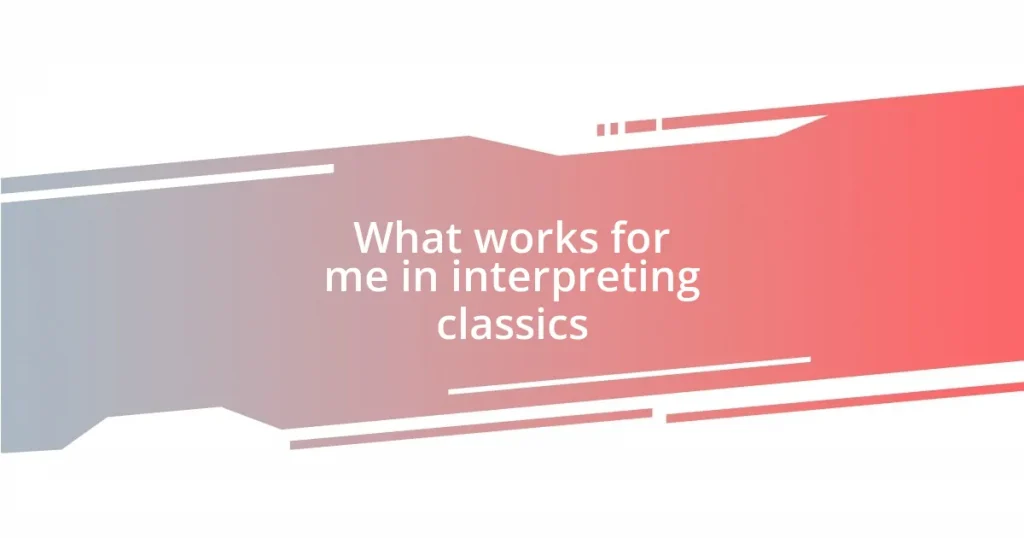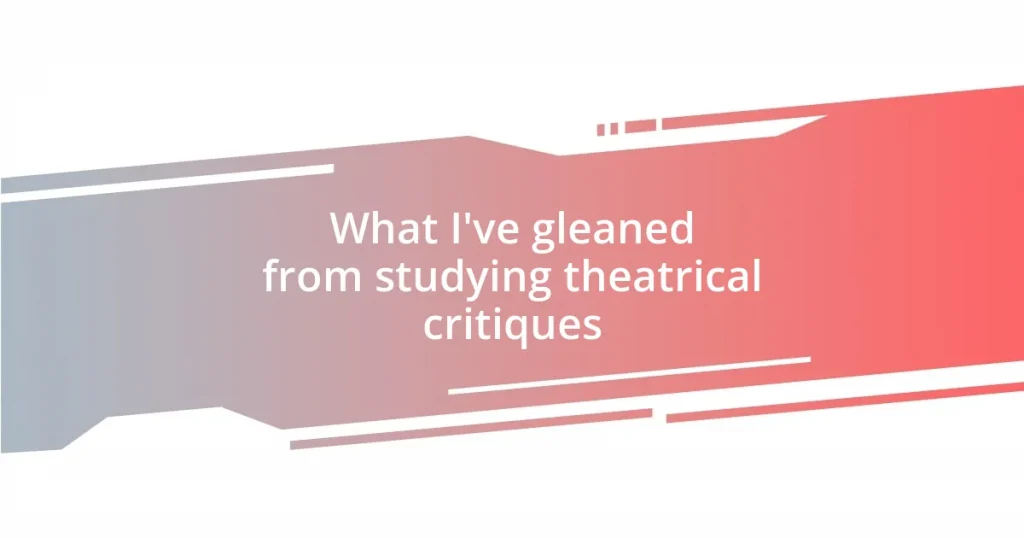Key takeaways:
- Personal recommendations and engaging with experienced coaches are vital for finding effective voice acting training resources.
- Practicing breath control, vocal warm-ups, and experimenting with different styles enhance vocal skills and confidence.
- Creating a professional demo reel requires careful selection of diverse samples, high-quality recording, and personal touches.
- Navigating auditions effectively involves preparation, embracing feedback, and cultivating self-confidence through visualization.

Finding the right training resources
Finding the right training resources in voice acting can feel overwhelming at first. I remember sifting through an ocean of online courses and workshops, each promising to unlock my potential. How do you know which are worth the investment?
After much trial and error, I discovered that personal recommendations often led me to the best programs. I leaned heavily on online forums and social media groups where fellow voice actors shared their experiences. There’s something special about connecting with those who have walked a similar path—it’s reassuring and can save you from spending money on lackluster resources.
I also found great value in live classes over pre-recorded ones. The immediate feedback from instructors made all the difference. Have you ever tried to improve your skills without a guiding hand? It’s like trying to learn to ride a bike without someone running alongside you. Engaging with experienced coaches not only refined my technique, but it also instilled confidence that I carried into auditions.

Building vocal skills and techniques
Building vocal skills in voice acting requires dedication and a structured approach. From my experience, practicing breath control was a game changer. When I first started, I underestimated the power of breath. Taking deep breaths not only helped me manage nerves but also enhanced my vocal projection. I remember recording myself—it was enlightening to hear the difference that proper breathing techniques made to my delivery.
Vocal warm-ups became an essential part of my routine. Initially, I thought these were just for singers, but I quickly learned how valuable they are for voice actors too. Simple exercises, like humming or lip trills, helped in relaxing my voice. I felt a noticeable difference in how smooth my transitions were during recordings. Have you ever tried vocal exercises before speaking? It’s remarkable how they can free up your vocal cords, allowing for more dynamic expression.
Finally, experimenting with different vocal styles is crucial. I found myself diving into diverse genres—from character voices to commercial reads. This not only broadened my skillset but also sparked creativity. I recall one time attempting a quirky character voice; it was a fun challenge that pushed me out of my comfort zone. Each attempt helped me discover new aspects of my vocal range, leading to growth I hadn’t anticipated.
| Vocal Skill | Technique |
|---|---|
| Breath Control | Deep breathing exercises to manage nerves and enhance projection |
| Vocal Warm-Ups | Hum and lip trill exercises for relaxation and smooth transitions |
| Vocal Style Experimentation | Practice across genres to spark creativity and discover new ranges |

Creating a professional demo reel

Creating a professional demo reel
Crafting a professional demo reel can feel like piecing together a puzzle that showcases your unique voice and style. From my own experience, I remember that selecting the right clips felt daunting; I wanted to represent my range without overwhelming the listener. A demo is often your first impression, so choosing the best samples is crucial. This is your chance to shine!
Here are some tips that helped me in this journey:
– Keep it concise: Aim for a duration of 1 to 2 minutes to maintain the listener’s attention.
– Diverse samples: Include various styles—commercial, character, and narration—to display your versatility.
– Quality recording: Ensure the audio is clear and professional; a noisy or poorly edited reel can detract from your talent.
– Personal touch: Consider adding a short introduction to showcase your personality; it makes the demo feel more engaging.
– Feedback is valuable: Share drafts with trusted peers or mentors to gain insights and refine your selections.
I vividly recall the moment I finished my first demo reel. I played it back, holding my breath, and felt a mix of pride and vulnerability. Hearing my voice encapsulated in a polished piece made the countless hours of practice seem worthwhile. That moment was an exhilarating reminder of how far I’d come, and it spurred me to keep pushing forward in my voice acting journey.

Navigating the audition process
Navigating the audition process can feel like walking a tightrope—one misstep, and you’re off balance. I remember my first audition: I was so nervous that my voice shook. But as I learned, preparation plays a vital role in calming those jitters. Researching the project and understanding the characters made a massive difference. Have you ever gone into a situation feeling completely unprepared? It can be overwhelming. The moment I realized the audition was about storytelling, not just reading lines, my approach completely shifted.
Then there’s the importance of accepting feedback. Early on, I found myself defensive when receiving critiques. It took me a while to understand that constructive criticism is a precious gift, not a personal attack. The first time a director pointed out something I could improve, I felt a twinge of disappointment, but after reflecting on it, I used that insight to refine my performance. Embracing feedback allowed me to grow and succeed in future auditions.
Finally, confidence can be your greatest ally. I vividly recall a particular audition where my self-assurance transformed my delivery. Picture this: I stepped into the room, scanned the panel, and suddenly realized they were rooting for me! That connection energized my performance. So, how do we exude confidence? For me, it’s all about visualization—before an audition, I would picture myself nailing the character in the role, and believe me, it works wonders! Engaging with your inner character can turn any audition into an exciting performance opportunity.

Overcoming challenges in the industry
Facing challenges in the voice acting industry can feel like an uphill battle, but each obstacle is an opportunity for growth. I remember one of my early gigs where everything seemed to go wrong—the script changes at the last minute had me scrambling. I had to learn quickly; embracing adaptability became essential. Have you ever had everything go sideways right before an important moment? Those experiences taught me that staying calm and flexible keeps the performance intact.
Another challenge I encountered was the fierce competition. It’s easy to feel disheartened when you see talented voices pouring into auditions. I learned the power of networking and collaboration. Building relationships with fellow artists opens doors and nurtures a sense of community, which can ultimately outweigh the competition. What if I told you that some of my best opportunities came from connections made over coffee and shared auditions? It’s a reminder that sometimes, it’s about who you know just as much as what you can do.
Finally, let’s talk about self-doubt. I’ve faced days where I questioned whether I truly belonged in the industry. I found solace in reflecting on my journey and recognizing my unique voice. It’s vital to remind ourselves that we each bring something special to the table. If you’ve ever felt that way, remember, overcoming self-doubt doesn’t mean eliminating it; it’s about learning to push through and trust your abilities. I’ve learned to keep a journal of affirmations, which helps me stay grounded and focused. Keeping that clarity has made all the difference in my voice acting path.
